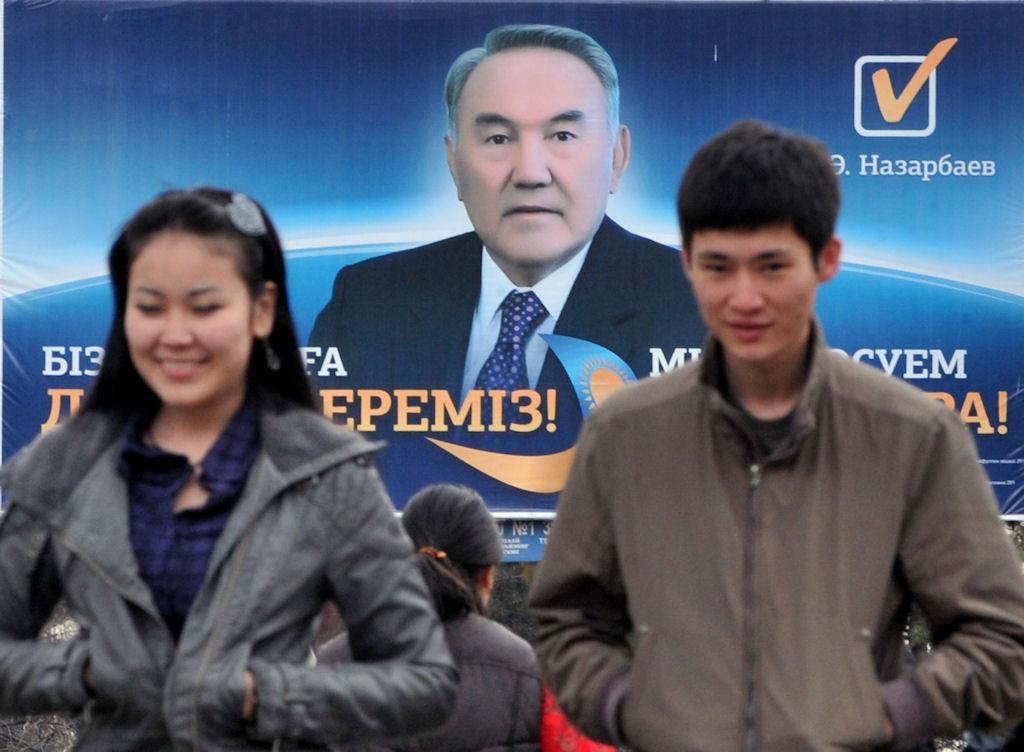Why the protest bug hasn’t spread to the former Soviet Union
People walk by an election poster of Kazakhstan President Nursultan Nazarbayev in Almaty, on April 2, 2011.
KIEV, Ukraine — As populations across the Middle East and North Africa erupt in violence, chaos and sometimes jubilation in their attempts to throw off decades-old authoritarian rule, the silence in the states of the former Soviet Union — most which have similar political systems — has been deafening.
Many observers cast serious doubts that the protests of 2011 could ever spread north, given on one hand, the widespread passivity and distrust of the democratic process throughout the ex-communist sphere, and on the other, the brutal nature of these authoritarian governments.
But others are not so certain: The seeds of discontent are there, they say. Just wait.
At the moment, nonetheless, democracy movements across the former Soviet Union haven’t been allowed to emerge, much less gather momentum.
Belarus strongman Alexander Lukashenko has all but crushed anti-government sentiment in his country after engineering a highly questionable presidential victory in December, last year. Azerbaijan authorities used overwhelming force this past weekend, beating protesters and arresting dozens (as well as reportedly using tear gas and rubber bullets), to prevent a small unsanctioned rally in downtown Baku.
And in Kazakhstan on Sunday, President Nursultan Nazarbayev, who has ruled the country since the Soviet period, won another five-year term with 95 percent of the vote and 90 percent turnout. Western observers from the Organization for Security and Cooperation in Europe cited “serious irregularities,” such as coercion to vote, ballot box stuffing and a deficit of real opposition candidates to Nazarbayev.
Nazarbayev, however, was unfazed by the criticism. After the vote, he told a meeting of hundreds of worshipful supporters that the results were more than legitimate and the election proved that Kazakhstan would not follow the path of Egypt or Tunisia.
“More than 90 percent for one candidate — this is a sensation for Western states,” he said. “We showed that if presidential elections divide the people into different party blocks, we have united. If there is bloodshed in the world, international enmity, we are united.”
Make no mistake — a large number of Kazakhs love Nazarbayev. He has preserved stability in his central Asian state as other ex-Soviet republics disintegrated into chaos. Meanwhile, the country’s economy, bobbing on a sea of oil, has boomed. Per capita GDP has increased twelvefold since the 1990s, placing Kazakhstan just below Turkey.
But is Nazarbayev, or any of the former Soviet Union’s other repressive regimes, truly immune to the rage for change?
Kazakhstan in fact displays many of the same ailments that have brought the masses onto the squares of Cairo, Tunis, Sanaa and Damascus. In Azerbaijan, Uzbekistan, Tajikistan, Turkmenistan and Armenia — not to mention Russia — the situation is even more pronounced. Corruption is epidemic. Much of the country’s wealth is siphoned into the pockets an oligarchic few (which allegedly include members of the first family). Hospitals, schools and other social services are still widely in disrepair. The media are muzzled. And a young, well-educated middle class has been locked out of the political process.
Nevertheless, most regional experts are counseling against any predictions of mass uprisings. First, the former Soviet Union already experienced its own spate of revolutions in the last decade. The fact that many of these left the hopes that they raised to a large degree unfulfilled has left a large number of people across the region suspicious and cynical about popular protest movements in general.
“There is no expectation that revolution produces change,” said Oksana Antonenko, program director for Russia and Eurasia at the International Institute of Strategic Studies in London. “One elite group simply replaces another elite group.”
Moreover, opposition groups are ineffectual, either through their own ineptitude, or the governments’ persistent efforts to harass and co-opt them. Even when protests take place, local officials act quickly and decisively to prevent them from gaining traction, as the recent rallies in Baku and Minsk demonstrated. And if a demonstration reaches critical mass, authorities can snuff it out with the most ruthless means available: in 2005, soldiers opened fire on a protest in the southern Uzbek city of Andijan, killing perhaps hundreds.
“Peaceful demos can’t happen at all,” said Antonenko. “Police will stop at nothing. And they won’t allow days and weeks of demos, as is happening now in the Middle East.”
But others say that the regimes’ seeming impenetrable facade is possibly an illusion. Maybe the uprising won’t take place tomorrow, or even this year, but the objective reality of poverty, repression and corruption in the former Soviet states dictates that people will demand a change at some point.
Eric McGlinchey, assistant professor of government and politics at George Mason University in Fairfax, Va., said that uncertainty over who will succeed the aging authoritarian leaders of central Asia is injecting instability into their political systems, which then could spill onto the streets.
“[Uzbek President Islam] Karimov and Nazarbayev are vulnerable and getting more so by the day. The political calculations of countries’ elites change as their dictators age,” McGlinchey said.
“Winning coalitions become less stable and people are more likely to jump ship. Nazarbayev and Karimov need a clear line of succession or the putsch will be sooner rather than later,” he added.
And as the examples of Egypt, Tunisia and Libya have shown, these leaders appear to be all-powerful — up until the moment when they aren’t.
Every day, reporters and producers at The World are hard at work bringing you human-centered news from across the globe. But we can’t do it without you. We need your support to ensure we can continue this work for another year.
Make a gift today, and you’ll help us unlock a matching gift of $67,000!
